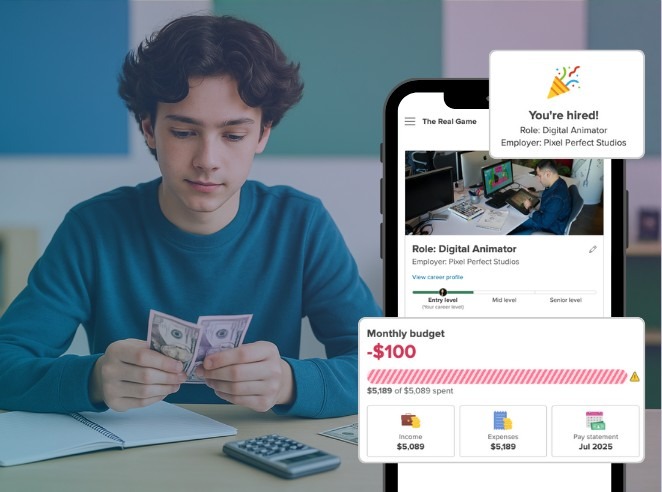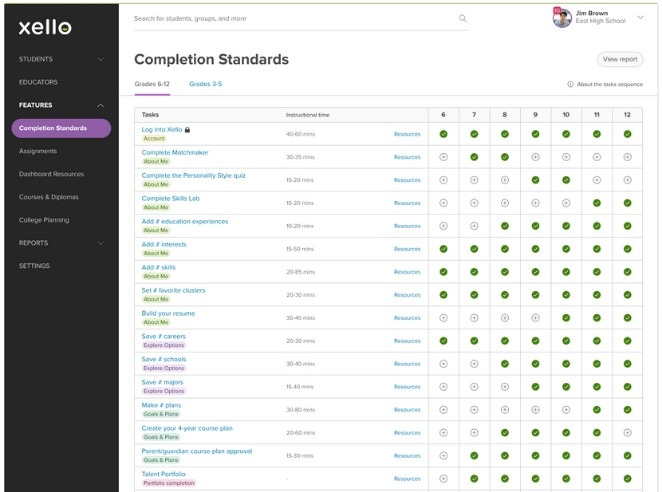How Xello Supports the ACTE Quality CTE Program of Study Framework

Student career development was identified as a key element in the ACTE Quality CTE Program of Framework. Find out how Xello fosters this through its future readiness program.
Career and technical education (CTE) has grown in popularity over the past decade. According to Education Week, “about 8.3 million high school students—nearly half the U.S. high school population—were enrolled in one or more CTE courses in 2016/17.” In the 2007/08 school year, the number was 7.6 million—showing clear growth in CTE programming and enrollment in just over a decade.
According to the Association of Career and Technical Education (ACTE), a high-quality CTE program enables students to “explore careers and make informed decisions to help them achieve their goals.”
So what constitutes a high-quality CTE program?
The ACTE Quality CTE Program of Study Framework, Explained
The ACTE set about answering this question. They conducted a study to recognize the successful elements of a CTE program and how to scale them.
The study, along with research and interviews, led to the Quality CTE Program of Study Framework. ACTE’s belief is that the Framework will bring “clarity to this conversation and help CTE educators and administrators develop and improve the quality of their CTE programs.”
The framework is made up of 12 elements:
- Standards-aligned and Integrated Curriculum
- Sequencing and Articulation
- Student Assessment
- Prepared and Effective Program Staff
- Engaging Instruction
- Access and Equity
- Facilities, Equipment, Technology, and Materials
- Business and Community Partnerships
- Student Career Development
- Career and Technical Student Organizations
- Work-based Learning
- Data and Program Improvement
In addition to the 12 elements, the ACTE Quality CTE Program of Study Framework has 92 “criteria [which] describe how a quality career development system helps students gain career knowledge, engage in education, career planning. and decision-making through comprehensive and systemic career development services. [In addition] individualized career and academic planning, up-to-date information, job search and placement services as the student nears program completion, and continued learning for career development professionals.”
Focusing on Student Career Development
The advent of career guidance can be traced back to the early 20th century. At that time new immigrants, as well as Americans from rural areas were flocking to cities. To help people recognize their options and find suitable jobs, a bureau of vocational guidance was created.
Fast forward to today when student career development is regularly identified in the national quality frameworks reviewed by the ACTE and thus has been recognized by the ACTE as one of the 12 elements on its high-quality framework:
“This element addresses strategies that help students gain career knowledge, engage in education, career planning and decision-making. This includes career counseling, career assessments, curricula that helps students learn about careers, information about educational opportunities and workforce trends, and job search information and placement services.”
Now, with the framework and focus on student career development in place, how can educators bring this to life in the classroom?
Xello and the Framework: Student Career Development Starts Early
Two of the criteria under student career development focuses on comprehensive coordinated services, which incorporate a range of activities—like work-based learning experiences. And this is key: The simple act of exploring and understanding the make up of a workday already puts your students in early control of their future development.
But your work doesn’t end there. Students need to think beyond a career’s technical skills and consider the soft skills that will get them there.
An Inside Higher Ed article reported on a study from Cengage Learning that underscores the value employers place on soft skills. Three of the top four skills most demanded by employers are soft skills: Listening skills (74%), attention to detail (70%), and effective communication (69%).
This really isn’t surprising since many people spend as much—if not more time—with their co-workers than their own families. A good workplace dynamic includes employees with pleasant personalities who are adept at soft skills.
Xello’s program allows students to build 21st century skills to help them thrive. Through assessments built into the program that evaluate personality traits, learning styles, and more, students are equipped with the knowledge, real-world skills, and planning capabilities to navigate their future. It begins with assessments that help students build self-knowledge and encourage reflection.
Manage Student Career Aspirations Directly from Your Future Readiness Tool
Here’s a fun fact: ACTE identified middle school as an opportune time to begin learning about careers in depth. What’s more, the dynamic economy and the technological revolution has created many new career paths—some that are yet to be defined. So it’s essential to get a head start because career planning can get overwhelming and confusing… fast.
To temper the plethora of options, each CTE student in the program of study has a personalized, multi-year education and career plan that reflects exploration of the student’s interests, preferences, and abilities, and informs course selection, planning for further education and a career, and involvement in extended learning.
ACTE recognizes multiple studies, which discovered that “personalized planning for education and careers is fundamental to quality career development and has been found to benefit students with increased motivation, better grades and selection of more rigorous courses.”
Kids’ interests change all the time. Therefore, ACTE advises that the personalized student plans should be reviewed every year and at “key decision points throughout the student’s academic and career pathway.”
Regular reviews enable students to respond to personal changes, as well as changes in educational and employment opportunities.
As noted above, allowing students to take a personal stake in their education has positive effects, including increased motivation. This is already in effect in all high schools in Arizona’s Phoenix Union High School District, where Xello helps students take ownership over their career exploration and planning.
Through self-guided investigation with Xello and activities led by CTE-certified teachers, students identify a career of interest and design the education and employment pathway that will help them get there.
A former counselor facilitator for the district Amanda Nolasco says, “Students are excited to use Xello to support career exploration and respond well to its data visualization and ease of navigation.”
Valuing All Pathways and All Students
As of late, the post-high school path hasn’t been so linear. There once was a time when few high school graduates went to college. And in the early 2000s, the philosophy was college for all. While today many still aspire to and attend a four-year college, plenty are choosing alternative paths, from trade school to an associate degree to going directly into the workforce.
To address this reality, multiple criteria under student career development focus on disseminating accurate and timely information to students and their guardians to ensure they are aware of their options and can choose the appropriate path.
The information focuses on further education and training options. These include application procedures, enrollment, financing, and projected educational, employment, and earnings outcomes. In addition, this also includes regional occupational trends and outlooks, high-demand and high-wage career opportunities, and the educational pathways that lead to current and projected career opportunities.
Whatever the path, Xello supports and values each student’s choice, leading to engagement in meaningful and sustaining work. The program also helps schools meet their local and federal requirements of effectively preparing students for college and careers.
Conclusion
The ACTE Quality CTE Program of Study Framework is setting and raising the bar for CTE education. Schools that implement the framework do their students a great service.
The student career development element is key to the framework as it assists students while in school and as they move forward. The emphasis on personalization, and the value of all choices are meaningful criteria the Xello program supports. With the program, schools can ensure they meet the criteria of a high-quality CTE program of study.



